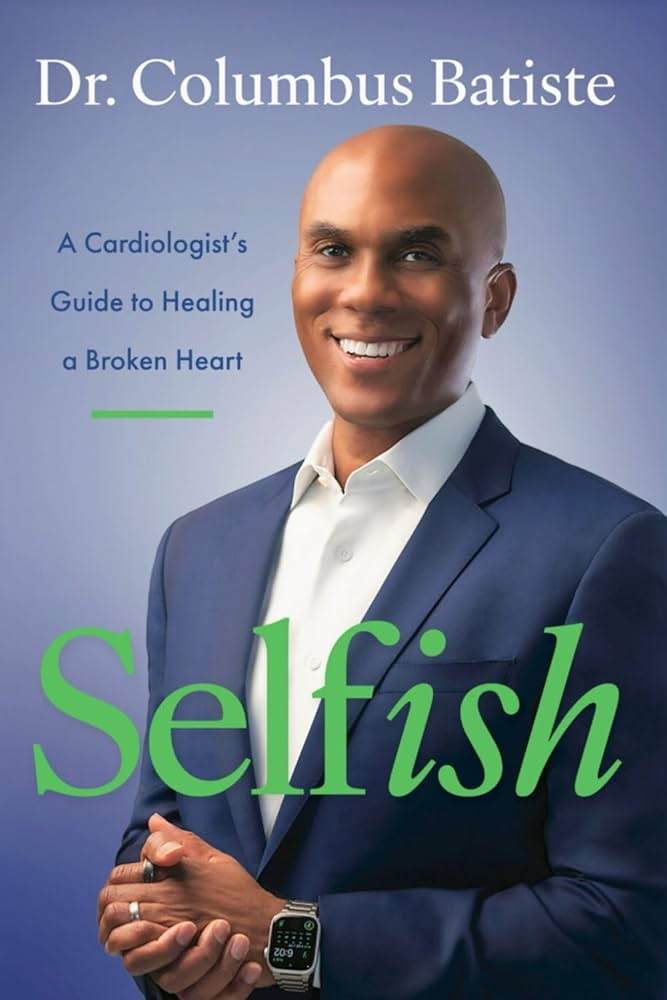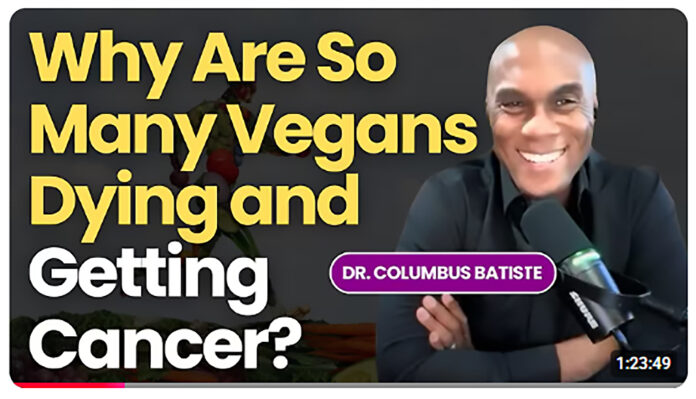by Peter Barclay
It will probably go down as one of the most Iconic interviews Chef AJ has ever posted. Not so much for its broad practical advice, although there are some valuable offerings on that front, but more for its confronting honesty and incisive title: Why Are So Many Vegans Dying and Getting Cancer?
Of course, the title didn’t sit well with some responders, but for those that listened, it made a good point – none of us are exempt from every health issue out there. The diet we live by provides seat belt protection at best.
For Dr Columbus, life span is almost irrelevant; it’s what we do in that period between the two numbers that say ‘born 1947, died 2025’ (1947-2025) that counts. He calls it the dash in between.
The focus of this discussion was on the claims made around healthy eating and the implication that it enables an almost automatic right to longevity. Not so, says Baptiste, who notes that while some studies may point to a 20 per cent advantage, a full 80 per cent of us can only ever expect a normal lifespan.
Too many variables
The fact is that there are just too many variables at stake here. Many of us, and perhaps more than previously, will draw the long string; others, no matter what they eat, won’t make it past summer camp. And there are those, like the case of New Zealand teenager Katie Iti, who died last Saturday, who did more in her brief lifespan than many of us will in 50 years.

Background and book
Dr Batiste, MD, FACC, FSCAI, is a board-certified Interventional Cardiologist. He served as the Chief of Cardiology at Kaiser Permanente Riverside and Moreno Valley Medical Centres from 2008 until 2020. In 2011, Dr Batiste led the establishment of the Integrative Cardiovascular Disease Program (based at Kaiser Permanente).
His book, Selfish, centres around the idea that prioritising your health, well-being, and self-care is not truly selfish — it’s essential for living a fulfilling life and supporting those you love.
Personally, I owe it to young Edyn Rubena-Mislisi for making me think deeply about the dangers of food and its impact on us. I realised I was given a chance to weigh up what I was eating. Edyn’s life was cut short by an allergy to nuts.
Although it may not be deliberate, Chef AJ, seems to be on a bender to mollify our expectations around the diet with a reality check that’s probably long overdue. I guess that’s what you do when you face up to cancer as she is.
In a follow-up discussion on the same subject with Dr Ron Weiss a few days later, she says:
“I know people who are raw foodists, they think of that like the epitome, like the highest … and I don’t want to say names because I can’t. There are people who we couldn’t mention on the show because they have cancer, who are vegan, who are not talking about it or other chronic diseases, because they have books and they have followings. And I hear from them, and it’s like Wow, I can’t believe you did this, and I can’t do it. I can think of two raw foodists from back in the day, one died of pancreatic cancer, and one died of colon cancer… I mean, they had what I would call the most pristine diets. There’s something else going on, but people focus on the diet and dietary perfection and not all the other things.”
Admittedly, AJ is likely still in the throes of coming to terms with her own diagnosis, but the discussion around “diet perfection” is central to us all, and in both interviews, the dangers of making it your sole focus are made perfectly clear.
“The question always amounts to: What is our health span?” Batiste says.
Our best life
“In that period of time, how are we living our best life, or how are we living with a life of purpose, becomes extremely important.
“And so yes, we understand that it’s all about risk, and so adopting plant-based nutrition, a vegan lifestyle that’s centred on a whole food plant-based diet is one in which we’re lowering our risk.
“But no one should ever excuse that for saying the risk is zero. Or that because someone dies, it means it’s not beneficial; it is. We don’t know how many years of life were extended in each of those individuals. One, by their purpose, and two, they’re exercising their belief, and most importantly, the nutrition that they were eating that was helping their body fight.
According to Batiste, health is shaped by a combination of many factors and lived experiences. These influences not only shape who we are but also impact our current and future health.
“Our health really, truly equals our resiliency, divided by our stress,” he says. “I do believe that stress is a common thread for disease, and that stress leans itself over into an inflammatory process, whether or not it’s on the microscopic level of oxidative stress, or whether or not it’s on a macroscopic level in terms of perceived stress. That perceived stress of the environment that we live in, 24/7 news, or even the fear of a death, of what may happen, from seeing things that transpire with others.”
Paranoid perfection problems
His comment was in response to an observation from AJ that several well-known WFPB advocates had died with conditions that should have been prevented with lifestyle medicine.
“I remember a couple of years ago, when Hans Diel had his stroke and I was very upset, and we talked and then ultimately, unfortunately, he died, and then almost to the day a year later, Dr McDougal passed away,” she said.
“Now we have the wonderful Dr Baxter Montgomery, who was much younger than the other two, and John Robbins. We receive a lot of questions, with many people doubting that there’s any reason to adopt a plant-based diet, because all these vegans are dying. And they can point to me, well, look, you know, you did everything right, and you have cancer.”
Stress is constant, says Baxter, but the question is, how are we building our resiliency on a day-in, day-out basis to offset that stress consistently?
“Studies have demonstrated a relationship between perceived stress, and why it’s so important that it’s characterised as perceived stress, is because we all perceive life events differently.”
No inside information
Chef AJ: Let’s talk about some of our colleagues, and first of all, we don’t have any inside information, but a lot of people think, like there’s some kind of conspiracy about the way that some of these doctors passed away. Hans and Dr McDougal were 77, Dr Montgomery, was, I believe, 61, and John Robbins was 77, but he had post-polio syndrome. Maybe you could spotlight a little bit about these doctors because people are just like, well, if they did everything right, and they’re dying of these serious diseases, why should I even bother eating healthily?
Dr Batiste: I think we have to be careful in terms of the judging aspect…there is not one sole ingredient. When we look at the lives of these individual physicians, and I can’t speak to them personally in terms of what their journey was or their burden, but I can empathise with them. That one, when you’re a physician, it can be hard at times to go see other physicians – the concept out there is that you have to inspect what you expect, so how often are we inspecting?
For me, the takeaway here is that although I may expect a WFPB diet always to do only good things, it doesn’t change the fact that I still need regular checkups that include blood and urine tests, along with everything else that’s recommended.
Fact Check ……………………………………..
So, is there any evidence to suggest that more vegans are dying of cancer compared to non-vegans? No. In fact, most scientific research indicates that vegans and vegetarians tend to have a lower risk of certain types of cancer compared to the general population.
Large observational studies like the EPIC-Oxford study and Adventist Health Studies consistently show that plant-based diets are associated with a lower risk of:
- Colon cancer
- Stomach cancer
- Certain hormone-related cancers (like breast and prostate cancer)
Vegans typically have:
- Lower body mass index (BMI)
- Higher consumption of fruits, vegetables, and fibre
- Reduced consumption of red and processed meat (both of which are linked to higher cancer risk)
Being vegan is not linked to increased cancer deaths. On the contrary, a well-planned vegan diet may offer some protection against several types of cancer. As with any diet, however, nutritional adequacy is important.
Sources:
- EPIC-Oxford Study (2014): Vegetarian Diets and Cancer Risk
- World Health Organization – Diet, Nutrition, and the Prevention of Chronic Diseases
- American Institute for Cancer Research: Anti-inflammatory diets and cancer risk
A final word ……………………………….
In response to the video, Trish Finch posted a comment worth considering:
“My question is about the statistics of “so many vegans”, how many? And those who have died are what age? Are the numbers crazy high, and are they dying really young? Or is this something that is standing out to you now that you have cancer and you’re thinking about it constantly? When I got a different vehicle or when I was pregnant, I would see that same vehicle and pregnant women everywhere. Now that I don’t have that car and haven’t been pregnant for 10 years. I feel like I never see pregnant women anymore.“





